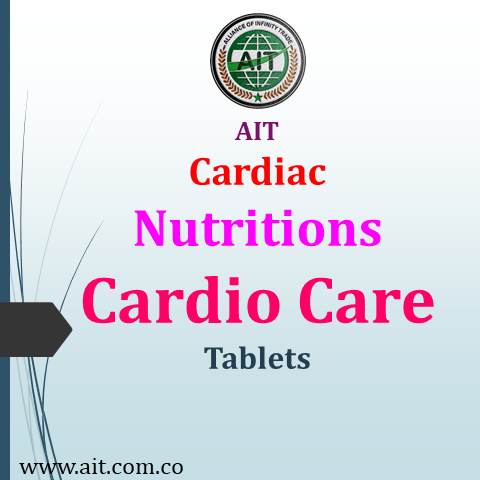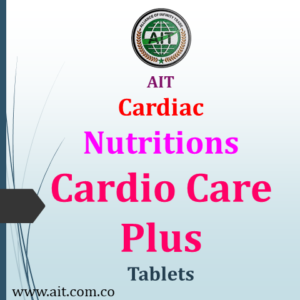Alliance of Infinity Trade
AIT Cardiac Nutritions Cardio Care Tablets
Nourishing Hearts, Strengthening Lives – Your Partner in Cardio Care
Introduction:
Welcome to AIT Nutraceuticals Division, where we are dedicated to promoting heart health through our innovative Cardio Care Supplement Range. Developed by our esteemed R&D Department, these supplements are meticulously crafted to support cardiovascular function and overall well-being. At AIT, we understand the significance of cardiovascular health and strive to provide top-quality nutritional support to individuals looking to maintain a healthy heart.
Share
Importance of Nutrition for Cardio Care Health:
Maintaining optimal nutrition is crucial for supporting cardiovascular health and reducing the risk of heart disease. A balanced diet rich in essential vitamins, minerals, antioxidants, and heart-healthy nutrients can help manage blood pressure, cholesterol levels, and inflammation, thereby safeguarding against cardiovascular complications. However, busy lifestyles and dietary limitations may make it challenging to obtain all necessary nutrients solely from food, making targeted supplementation a valuable addition to a heart-healthy lifestyle.
Product Preview:
Introducing AIT Cardiac Nutritions Cardio Care Tablets, a comprehensive solution for cardiovascular support. With a carefully curated blend of 22 ingredients, our Cardio Care Supplement Range is designed to complement heart-healthy lifestyles. Each tablet is packed with vital nutrients, including L-Carnitine and Coenzyme Q10, to promote heart health, improve circulation, and enhance overall vitality. Take charge of your cardiovascular wellness with our potent formula, crafted to support optimal heart function and vitality.
Detailed Ingredient Information for Cardio Care:
-
- L-Carnitine (20 mg): L-Carnitine is an amino acid derivative that plays a crucial role in energy metabolism, particularly in the transport of fatty acids into the mitochondria where they are converted into energy. Supplementation with L-Carnitine has been associated with improved heart health by enhancing energy production in cardiac cells, reducing oxidative stress, and improving exercise tolerance in individuals with heart conditions.
- Coenzyme Q10 (Co-Q10) (3 mg): Coenzyme Q10 is a powerful antioxidant and essential component of the mitochondrial electron transport chain, where it plays a key role in energy production. It supports heart health by enhancing cellular energy metabolism, reducing oxidative stress, improving endothelial function, and protecting against cardiovascular damage.
- Beta Carotene (4 mg): Beta carotene is a precursor of vitamin A and a potent antioxidant that helps protect against oxidative stress and inflammation, both of which are risk factors for heart disease. It supports heart health by reducing the oxidation of LDL cholesterol, inhibiting the formation of arterial plaque, and promoting overall cardiovascular health.
- Flaxseed Oil powder (100 mg): Flaxseed oil is rich in alpha-linolenic acid (ALA), an omega-3 fatty acid known for its cardiovascular benefits. It helps reduce inflammation, lower blood pressure, improve cholesterol levels, and prevent the formation of blood clots, ultimately supporting heart health and reducing the risk of heart disease.
- Garlic Extract (Equivalent to 200 mg): Garlic has been used for centuries for its medicinal properties, including its ability to support heart health. It helps lower blood pressure, reduce cholesterol levels, prevent blood clot formation, and improve circulation, all of which contribute to a healthy cardiovascular system.
- Vitamin D (as D3 800 IU) (20 µg): Vitamin D plays a crucial role in heart health by regulating blood pressure, reducing inflammation, improving blood vessel function, and supporting overall cardiovascular health. Adequate vitamin D levels have been associated with a lower risk of heart disease and improved heart function.
- Vitamin E (40 mg): Vitamin E is a potent antioxidant that helps protect cells from oxidative damage and reduce inflammation, both of which are important for heart health. It also helps improve blood vessel function, prevent blood clot formation, and reduce the risk of heart disease.
- Vitamin C (80 mg): Vitamin C is a powerful antioxidant that helps protect against oxidative stress and inflammation, both of which can contribute to heart disease. It also supports healthy blood vessel function, collagen synthesis, and immune function, all of which are important for cardiovascular health.
- Thiamin (Vitamin B1) (10 mg): Thiamin is a B vitamin that plays a crucial role in energy metabolism and nerve function. It helps convert carbohydrates into energy, supports healthy heart function, and protects against oxidative damage to the heart.
- Riboflavin (Vitamin B2) (1.4 mg): Riboflavin is a B vitamin that is important for energy production, metabolism, and antioxidant activity. It helps convert food into energy, supports heart health, and protects against oxidative stress, ultimately contributing to cardiovascular health.
- Niacin (Vitamin B3) (16 mg): Niacin is a B vitamin that helps improve cholesterol levels, reduce inflammation, and support heart health. It helps raise HDL (good) cholesterol levels, lower LDL (bad) cholesterol levels, and reduce triglyceride levels, all of which are important for cardiovascular health.
- Vitamin B6 (8 mg): Vitamin B6 is a B vitamin that plays a crucial role in energy metabolism, neurotransmitter synthesis, and homocysteine metabolism. It helps reduce inflammation, support heart health, and prevent the buildup of homocysteine, a risk factor for heart disease.
- Folic Acid (200 µg): Folic acid is a B vitamin that is important for heart health as it helps reduce homocysteine levels, lower the risk of blood clots, and improve blood vessel function. It also supports healthy red blood cell production and DNA synthesis, contributing to overall cardiovascular health.
- Vitamin B12 (20 µg): Vitamin B12 is a B vitamin that is essential for nerve function, DNA synthesis, and red blood cell production. It helps reduce homocysteine levels, support heart health, and prevent anemia, all of which are important for cardiovascular health.
- Magnesium (60 mg): Magnesium is a mineral that plays a crucial role in heart health by regulating blood pressure, supporting muscle function, and maintaining heart rhythm. It also helps reduce inflammation, relax blood vessels, and improve insulin sensitivity, ultimately contributing to cardiovascular health.
- Iron (5 mg): Iron is a mineral that is important for heart health as it helps transport oxygen in the blood and support energy metabolism. It also plays a role in enzyme function and immune function, contributing to overall cardiovascular health.
- Zinc (10 mg): Zinc is a mineral that plays a crucial role in immune function, wound healing, and antioxidant activity. It helps reduce inflammation, support heart health, and protect against oxidative damage to the heart, ultimately contributing to cardiovascular health.
- Copper (1000 µg): Copper is a trace mineral that is important for heart health as it helps maintain healthy blood vessels, support red blood cell formation, and protect against oxidative stress. It also plays a role in energy metabolism and collagen synthesis, contributing to overall cardiovascular health.
- Manganese (2 mg): Manganese is a trace mineral that is important for antioxidant activity, bone health, and blood sugar regulation. It helps reduce inflammation, support heart health, and protect against oxidative damage to the heart, ultimately contributing to cardiovascular health.
- Selenium (100 µg): Selenium is a trace mineral that is important for heart health as it helps reduce inflammation, support thyroid function, and protect against oxidative stress. It also plays a role in immune function and antioxidant activity, contributing to overall cardiovascular health.
- Chromium (100 µg): Chromium is a trace mineral that is important for blood sugar regulation and insulin sensitivity. It helps improve glucose metabolism, reduce insulin resistance, and lower the risk of heart disease, ultimately supporting cardiovascular health.
- Iodine (150 µg): Iodine is a trace mineral that is important for thyroid function and hormone production. It helps regulate metabolism, support heart health, and maintain overall cardiovascular function.
Indications: Our Cardio Care Supplement Range is indicated for individuals seeking nutritional support for cardiovascular health and overall well-being.
Usage: Take one tablet daily with a meal, or as directed by a healthcare professional.
Dosage: One tablet daily.
Available Form: Tablets.
Packing: Our products are designed and packaged according to the specific requirements of the importing country, ensuring convenience and compliance for our customers.




Reviews
There are no reviews yet.